Engender blog
Guest post: Indyref discussion reveals enthusiasm for participatory decision-making
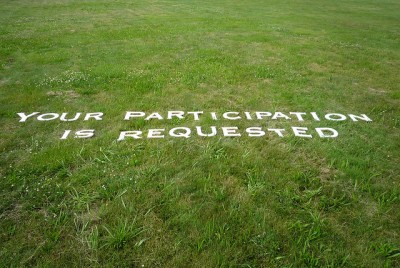
By Juliet Swann
As the date of the referendum draws ever nearer, and the gender gap in the polls shows no sign of closing, there seem to be more events targeting women and their opinions. Which is great, women’s voices should be heard in the referendum debate.
One such event held last week was organised by ACOSVO and the ESRC funded Future of UK and Scotland programme.
It began with four short presentations from Professor Kirsten Rummery, Audrey Birt, Ann Henderson, and Professor Nicola McEwen, each addressing gender issues in the debate about Scotland’s constitutional future. Thus inspired, we were then invited to talk between ourselves at our tables.
The women at my table were pretty evenly split between Yes, No and Don’t Know. The founders of Pink Ladies First, an amazing mental health facility for women in Midlothian were firmly in the Yes camp. They thought it was a chance for change that they couldn’t see being offered by staying in the union. “It has to start somewhere.”
Another woman, who worked in the private sector, was concerned that her job would be at risk as most of her clients were based in London, but her company’s head office is in Edinburgh. And if they moved their business, that would also be a loss of income to Scotland. Others felt the debate was failing to offer answers, and whilst accepting of the fact that more answers would come with subsequent elections, it was felt both campaigns are being less than open about the facts of the matter.
After the table discussions, Nicola Sturgeon MSP and Sarah Boyack MSP joined us to answer some of the questions raised during the evening. Unsurprisingly, they both agreed improvements must be made in gender equality.
But I was much more interested in the thoughts of the women at my table. Perhaps what was most exciting for me, as a representative of the Electoral Reform Society, was that everyone would have welcomed appropriate decision making being devolved to the local level, and involving more citizen voices.
Which is encouraging, as the results of both our Democracy Max inquiry and our From Centre to Community deliberative discussion event have led us to the conclusion that community participation in decision making, with the financial resource to back up those decisions, is key to reinvigorating democracy.
And if we are developing new ways of decision making, then we can grasp the opportunity to ensure all Scotland’s voices are represented, starting with 50/50. And empowering local communities, giving them more democratic power, doesn’t need a referendum; it just needs political will from our elected representatives. And now, when politics in Scotland is more energised than it has ever been, is the ideal opportunity to make our voices heard.
Read more about Democracy Max here.
--
Juliet Swann is the Campaigns & Research Officer for the Electoral Reform Society. She likes New Orleans, cheese, and reading women authors. She tweets at @ERSScotland.
The image 'Your Participation is Requested' was created by I Am, and is used with permission under the terms of a Creative Commons license.
Share this post on …
Comments: 0 (Add)
Downloads
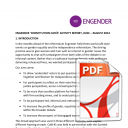 'Constitution Cafes' Activity Report
An activity report on three 'constitution cafe' discussion events on gender equality and the independence referendum, held between June and August 2014.
'Constitution Cafes' Activity Report
An activity report on three 'constitution cafe' discussion events on gender equality and the independence referendum, held between June and August 2014.
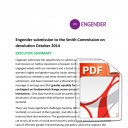 Engender Submission to the Smith Commission
Engender's submission to the Smith Commission on additional powers for the Scottish Parliament.
Engender Submission to the Smith Commission
Engender's submission to the Smith Commission on additional powers for the Scottish Parliament.
 Scotland's Futures: Women and Care
This briefing is part of a series that sets out how power and responsibility to tackle critical gender equality issues are divided between Holyrood and Westminster.
Scotland's Futures: Women and Care
This briefing is part of a series that sets out how power and responsibility to tackle critical gender equality issues are divided between Holyrood and Westminster.
 Scotland's Futures: Women and Poverty
This briefing is part of a series that sets out how power and responsibility to tackle critical gender equality issues are divided between Holyrood and Westminster.
Scotland's Futures: Women and Poverty
This briefing is part of a series that sets out how power and responsibility to tackle critical gender equality issues are divided between Holyrood and Westminster.
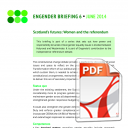 Scotland's Futures: Women and the Referendum
This briefing is part of a series that sets out how power and responsibility to tackle critical gender equality issues are divided between Holyrood and Westminster.
Scotland's Futures: Women and the Referendum
This briefing is part of a series that sets out how power and responsibility to tackle critical gender equality issues are divided between Holyrood and Westminster.
 Scotland's Futures: Women, Politics and Power
This briefing is part of a series that sets out how power and responsibility to tackle critical gender equality issues are divided between Holyrood and Westminster.
Scotland's Futures: Women, Politics and Power
This briefing is part of a series that sets out how power and responsibility to tackle critical gender equality issues are divided between Holyrood and Westminster.
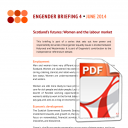 Scotland’s Futures: Women and the Labour Market
This briefing is part of a series that sets out how power and responsibility to tackle critical gender equality issues are divided between Holyrood and Westminster.
Scotland’s Futures: Women and the Labour Market
This briefing is part of a series that sets out how power and responsibility to tackle critical gender equality issues are divided between Holyrood and Westminster.

Newsletter
Sign up to receive our newsletter here:
Sign up to our mailing list
Receive key feminist updates direct to your inbox: